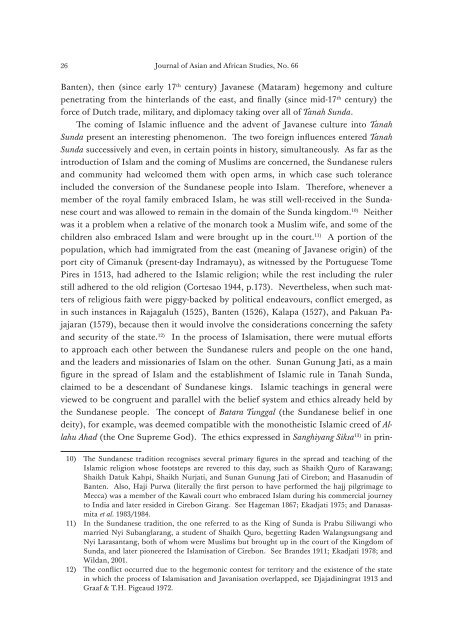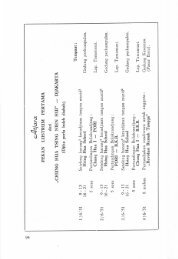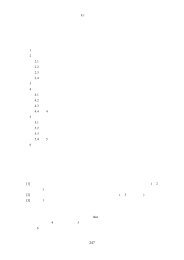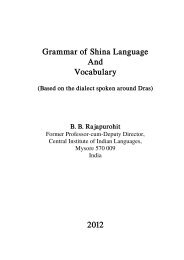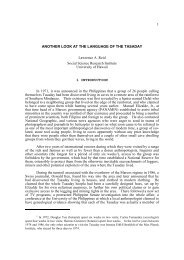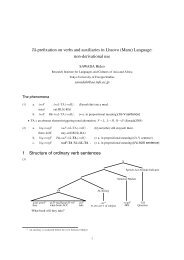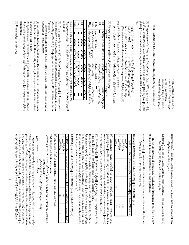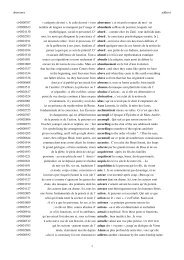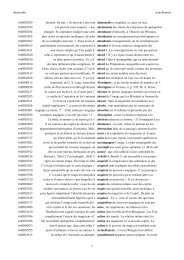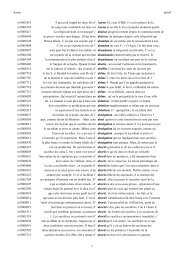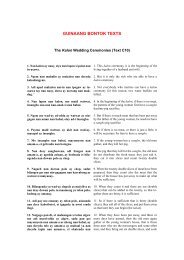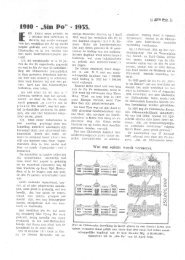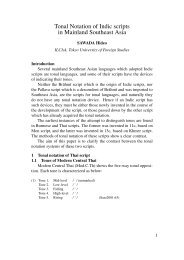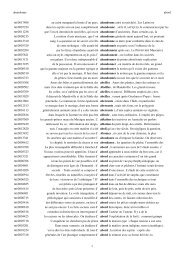ç® æ¬¡ - æ±äº¬å¤å½èªå¤§å¦ã¢ã¸ã¢ã»ã¢ããªã«è¨èªæåç 究æ
ç® æ¬¡ - æ±äº¬å¤å½èªå¤§å¦ã¢ã¸ã¢ã»ã¢ããªã«è¨èªæåç 究æ
ç® æ¬¡ - æ±äº¬å¤å½èªå¤§å¦ã¢ã¸ã¢ã»ã¢ããªã«è¨èªæåç 究æ
Create successful ePaper yourself
Turn your PDF publications into a flip-book with our unique Google optimized e-Paper software.
Journal of Asian and African Studies, No. <br />
Banten), then (since early th century) Javanese (Mataram) hegemony and culture<br />
penetrating from the hinterlands of the east, and finally (since mid- th century) the<br />
force of Dutch trade, military, and diplomacy taking over all of Tanah Sunda.<br />
e coming of Islamic influence and the advent of Javanese culture into Tanah<br />
Sunda present an interesting phenomenon. e two foreign influences entered Tanah<br />
Sunda successively and even, in certain points in history, simultaneously. As far as the<br />
introduction of Islam and the coming of Muslims are concerned, the Sundanese rulers<br />
and community had welcomed them with open arms, in which case such tolerance<br />
included the conversion of the Sundanese people into Islam. erefore, whenever a<br />
member of the royal family embraced Islam, he was still well-received in the Sundanese<br />
court and was allowed to remain in the domain of the Sunda kingdom. ) Neither<br />
was it a problem when a relative of the monarch took a Muslim wife, and some of the<br />
children also embraced Islam and were brought up in the court. ) A portion of the<br />
population, which had immigrated from the east (meaning of Javanese origin) of the<br />
port city of Cimanuk (present-day Indramayu), as witnessed by the Portuguese Tome<br />
Pires in , had adhered to the Islamic religion; while the rest including the ruler<br />
still adhered to the old religion (Cortesao , p.). Nevertheless, when such matters<br />
of religious faith were piggy-backed by political endeavours, conflict emerged, as<br />
in such instances in Rajagaluh (), Banten (), Kalapa (), and Pakuan Pajajaran<br />
(), because then it would involve the considerations concerning the safety<br />
and security of the state. ) In the process of Islamisation, there were mutual efforts<br />
to approach each other between the Sundanese rulers and people on the one hand,<br />
and the leaders and missionaries of Islam on the other. Sunan Gunung Jati, as a main<br />
figure in the spread of Islam and the establishment of Islamic rule in Tanah Sunda,<br />
claimed to be a descendant of Sundanese kings. Islamic teachings in general were<br />
viewed to be congruent and parallel with the belief system and ethics already held by<br />
the Sundanese people. e concept of Batara Tunggal (the Sundanese belief in one<br />
deity), for example, was deemed compatible with the monotheistic Islamic creed of Allahu<br />
Ahad (the One Supreme God). e ethics expressed in Sanghiyang Siksa ) in prin-<br />
) e Sundanese tradition recognises several primary figures in the spread and teaching of the<br />
Islamic religion whose footsteps are revered to this day, such as Shaikh Quro of Karawang;<br />
Shaikh Datuk Kahpi, Shaikh Nurjati, and Sunan Gunung Jati of Cirebon; and Hasanudin of<br />
Banten. Also, Haji Purwa (literally the first person to have performed the hajj pilgrimage to<br />
Mecca) was a member of the Kawali court who embraced Islam during his commercial journey<br />
to India and later resided in Cirebon Girang. See Hageman ; Ekadjati ; and Danasasmita<br />
et al. /.<br />
) In the Sundanese tradition, the one referred to as the King of Sunda is Prabu Siliwangi who<br />
married Nyi Subanglarang, a student of Shaikh Quro, begetting Raden Walangsungsang and<br />
Nyi Larasantang, both of whom were Muslims but brought up in the court of the Kingdom of<br />
Sunda, and later pioneered the Islamisation of Cirebon. See Brandes ; Ekadjati ; and<br />
Wildan, .<br />
) e conflict occurred due to the hegemonic contest for territory and the existence of the state<br />
in which the process of Islamisation and Javanisation overlapped, see Djajadiningrat and<br />
Graaf & T.H. Pigeaud .


